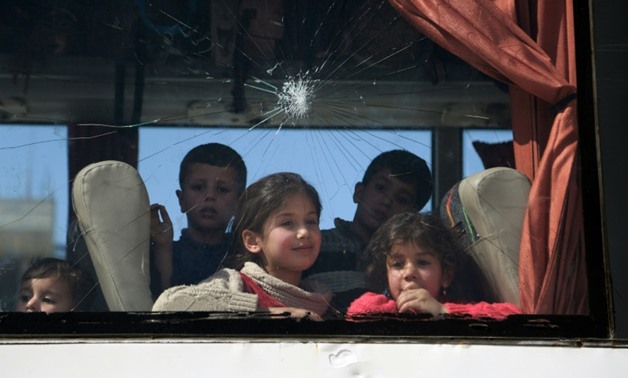
Buses carrying families of fighters from former rebel bastion Eastern Ghouta arrive at a checkpoint in northern Syria on April 5, 2018
SYRIA - 7 April 2018: Deadly air strikes slammed into the last opposition-held town in Syria's Eastern Ghouta on Friday, killing 32 civilians in the first bombardment since talks sputtered over a rebel withdrawal.
Backed by Russia, Syrian troops had captured nearly all of the one-time opposition stronghold of Ghouta with a combination of ferocious bombing raids and negotiated withdrawals.
All that remained was its largest town of Douma, held by the Jaish al-Islam Islamist faction and home to tens of thousands of people.
Moscow announced a deal with Jaish al-Islam last Sunday, ushering in three consecutive days of evacuations from Douma that saw nearly 3,000 fighters and civilians bussed to northern Syria.
But the evacuations stalled this week amid reports Jaish al-Islam remained divided over a withdrawal, and heavy bombing hit Douma on Friday afternoon for the first time in around 10 days.
The Syrian Observatory for Human Rights said dozens of air strikes hit various parts of Douma, including some suspected to have been carried out by Russian warplanes.
"At least 32 civilians died, including seven children," said Observatory head Rami Abdel Rahman, adding that around 50 people were wounded.
A medic inside Douma described to AFP a state of chaos at the local hospital as wounded and dead were being brought in.
"The hospital is in a state of panic," the medic said.
"Dentists are carrying out emergency surgeries. Dead bodies are being brought in pieces and are unrecognisable."
State news agency SANA said Syrian air strikes hit the town on Friday in response to deadly rebel mortar fire from Douma.
It said mortar shells hit several suburbs of the capital and killed at least one person and wounded more than a dozen.
The regime and its ally Russia launched a blistering air and ground offensive on Eastern Ghouta in mid-February, killing more than 1,600 civilians and causing an international outcry.
The enclave on the eastern edge of Damascus had escaped government control since 2012 and, although it had shrunk over the years, it still covered sizeable territory two months ago.
The daily air raids kept residents cowering in basements for weeks and a ground assault soon sliced the area into three isolated pockets, each held by different rebel factions.
- Deal dead? -
The first two were evacuated under Russian-brokered deals last month that saw more than 46,000 rebels and civilians bussed to the northwestern province of Idlib, which the regime does not control.
Tens of thousands of people also fled through humanitarian corridors opened by Russia and Syrian troops.
Some have already returned to their devastated neighbourhoods, while others are staying in crowded shelters.
As talks over the third and final pocket of Douma dragged on, Russia and Syria's regime threatened Jaish al-Islam with a renewed military assault if they did not agree to withdraw.
Those still trapped in Douma had been nervous that any attempt to renege on an evacuation would only prompt Russia and regime warplanes to resume deadly strikes.
The nature of the ongoing discussions over Douma is unclear and Jaish al-Islam itself has not stated its position since this week's first evacuation.
"It's very tense and there's a lot of confusion. We don't know where we're going, and rumours are flying in the town," said a resident reached by phone who gave his name as Mohammed.
"Waiting for the unknown, with rumours as your only source of information, is worse than the bombardment," said the young man, hours before Friday's fresh strikes.
Jaish al-Islam had been angling for a reconciliation deal that would allow them to stay in Douma as a police force.
The group appears to have little leverage, however, to face the regime's recovered might, and the latest strikes raised fears of a brutal end to the five-year-old siege of Eastern Ghouta.
"These air strikes are paving the way for a ground operation. Forces are already amassing and there is massive pressure on Jaish al-Islam," said Nawar Oliver, an analyst at the Omran Institute.
"The negotiations failed and the regime wants its conditions -- the air strikes are a taste of what could happen if its conditions are not implemented," he said.


Comments
Leave a Comment